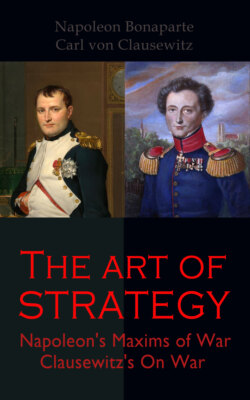Читать книгу The Art of Strategy: Napoleon's Maxims of War + Clausewitz's On War - Carl von Clausewitz - Страница 77
На сайте Литреса книга снята с продажи.
ОглавлениеMAXIM LXXII.
Table of Contents
A general-in-chief has no right to shelter his mistakes in war under cover of his sovereign, or of a minister, when these are both distant from the scene of operation, and must consequently be either ill informed or wholly ignorant of the actual state of things.
Hence, it follows, that every general is culpable who undertakes the execution of a plan which he considers faulty. It is his duty to represent his reasons, to insist upon a change of plan, in short, to give in his resignation, rather than allow himself to be made the instrument of his army’s ruin. Every general-in-chief who fights a battle in consequence of superior orders, with the certainty of losing it, is equally blamable.
In this last-mentioned case, the general ought to refuse obedience; because a blind obedience is due only to a military command given by a superior present on the spot at the moment of action. Being in possession of the real state of things, the superior has it then in his power to afford the necessary explanations to the person who executes his orders.
But supposing a general-in-chief to receive positive order from his sovereign, directing him to fight a battle, with the further injunction, to yield to his adversary, and allow himself to be defeated—ought he to obey it? No. If the general should be able to comprehend the meaning or utility of such an order, he should execute it; otherwise he should refuse to obey it.
NOTE.
In the campaign of 1697, Prince Eugene caused the courier to be intercepted, who was bringing him orders from the emperor forbidding him to hazard a battle, for which everything had been prepared, and which he foresaw would prove decisive. He considered, therefore, that he did his duty in evading the orders of his sovereign; and the victory of Zanta, in which the Turks lost about thirty thousand men, and four thousand prisoners, rewarded his audacity. In the meantime, notwithstanding the immense advantages which accrued from this victory to the imperial arms, Eugene was disgraced on his arrival at Vienna.
In 1793, General Hoche, having received orders to move upon Treves with an army harassed by constant marches in a mountainous and difficult country, refused to obey. He observed, with reason, that in order to obtain possession of an unimportant fortress, they were exposing his army to inevitable ruin. He caused, therefore, his troops to return into winter quarters, and preferred the preservation of his army, upon which the success of the future campaign depended, to his own safety. Recalled to Paris, he was thrown into a dungeon, which he only quitted on the downfall of Robespierre.
I dare not decide if such examples are to be imitated; but it seems to me highly desirable that a question so new and so important, should be discussed by men who are capable of determining its merits.
